TODAY’S HEADLINES:
- An Historic and Fearsome Worship Service at Sinai
- A Voluntary Bond Slave?
- Jesus and the Psalmist both confront Hypocrites
OLD TESTAMENT READING: Exodus 19:16- 21:21
GOD’S RIGHTEOUSNESS REVEALED AT SINAI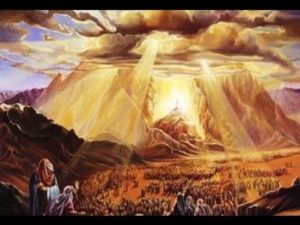
In Exodus Chapter 19, we see that God has brought the people of Israel to Mt. Sinai, also called Mt. Horeb or ‘the mountain of God’ (Exodus 3:1; 4:27; 18:5; 24:13).
This event is a fulfillment of the promise that God originally made to Moses when He revealed Himself at the burning bush (Exodus 3:12).
Exodus 3:12 This shall be the sign to you that it is I who have sent you: when you have brought the people out of Egypt, you shall worship God at this mountain.”
The God who created the heavens and the earth (Genesis 1 and 2) made Himself known to Abraham (Genesis 12), Isaac (Genesis 26), and Jacob (Genesis 28). He promised them a Redeemer (the promised Seed) and an inheritance (the promised land).
He also humbled Himself and chose to enter into a legal agreement called a ‘covenant’, with the Patriarchs and their descendants. The terms of this ‘covenant relationship’ between God and His people are progressively defined as God speaks to Abraham, Jacob, and Isaac. Now God has made Himself known to Moses. He is going to further define the quality of relationship that He wants to have with this new nation. He is preparing the people of Israel to receive 613 commandments known as the Law. These laws would spell out in writing their moral, social and ceremonial responsibilities before God. Israel would be put in a new position of accountability to Him. The Law is a revelation of God’s righteousness and outlines the requirements for holiness.
Romans 3:19-20 (NASB) 19 Now we know that whatever the Law says, it speaks to those who are under the Law, so that every mouth may be closed and all the world may become accountable to God; 20 because by the works of the Law no flesh will be justified in His sight; for through the Law comes the knowledge of sin.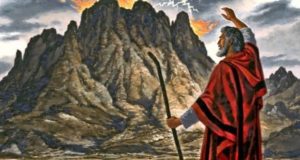
Notice that God did not say, “Keep these laws and THEN I will deliver you out of your bondage”. He introduces the Law by saying, “I am the LORD your God, who brought you out of the land of Egypt, out of the house of slavery.” (Exodus 20:1)
He brings His people out of Egypt and then brings them under His government that calls them to a holy life. The Israelites were chosen to be God’s treasured possession among the nations of the earth. The one true God was making Himself known to them and they, in turn, had the responsibility to make God known to the nations around them. The Law was reminding the people of their original God-given purpose- to reflect God’s righteous character in all of life. God was saying through the Law: “Be holy, as I am holy.”
God would use this Law to demonstrate that both the promised redemption and inheritance could only be granted if the conditions of God’s righteousness were fully satisfied.
The good news is that God, the Law-Giver, in Exodus 19, has promised to be the Law-Keeper, both on the cross and in the hearts of believers. Jesus fulfills the law’s demand for a righteous life (Matt 5:17) AND the Law’s demand for the righteous punishment for sin through His death on the cross as our atoning sacrifice.
God has a purpose for the law. It is holy, righteous, good, and spiritual (Romans 7:12,14). It brings to us the knowledge of sin. The Law was not given to show us how good we are, but how good we’re not! The Law shows us holiness but cannot make us holy, because it does not impart a holy life. The Law’s purpose is to point us to the gospel.
“To run and work the law commands
But gives me neither feet or hands
Better news the gospel brings
It bids me fly and gives me wings!” John Berridge (1716–1793):![]()
A thermometer is an instrument of diagnosis. It shows us if we have a fever. But we do not cure a fever by eating the thermometer! A mirror is an instrument to show us where we need grooming, but we do not wash our face or comb our hair with a mirror! As we examine our lives by the Law, we recognize that we have sinned and fall short of God’s glory (Romans 3:23). We don’t cure the problem of our sin, by looking to the Law. We look to Jesus! The Law was a guardian, (teacher) put in charge to bring us to Christ (Galatians 2:24-25). The law brings us to understand that we need a Savior. We need God’s grace.
We deserve God’s wrath, but He shows us His favor.
In Exodus 20 we are introduced to The Ten Commandments, known as the Decalogue, given to Israel.
- Worship no other gods. (NO FALSE GODS; THAT INCLUDES YOU)
- No created things (Idols) are to have any power over you. (NO FALSE WORSHIP OF THINGS).
- Don’t misuse God’s Name.
- Keep the Sabbath holy (This was a sign of God’s covenant with Israel).
- Honor your parents.
- Don’t murder.
- Be faithful to your spouse (Do not commit adultery).
- Don’t steal.
- Don’t lie.
- Don’t covet what belongs to others.
We can see how these laws highlight the original relationship that mankind was to have with God. We were made in His image to reflect His moral character. We were created to have fellowship with God and tell the truth about Him. “Do not steal,” says the Law. Why? Because God is not a thief. We were created, to tell the truth about God, and every time you steal you tell a lie about Him instead. “Do not commit adultery”. Why? Because God is faithful and pure. And to commit adultery is to tell a lie about God.
Soon we will see that the Law will only be perfectly kept when God, the Law-Giver, becomes a man, the Law-Keeper. He brings the truth about God’s righteousness to light in a way that the written law could not.
The Apostle John explains:
John 1:17-18 (NASB) 17 For the Law was given through Moses; grace and truth were realized through Jesus Christ. 18 No one has seen God at any time; the only begotten God (Jesus) who is in the bosom of the Father, He has explained Him.
The Apostle Paul explains that Christ does what the Law, in itself, could not:
Romans 8:3-4 3 For what the Law could not do, weak as it was through the flesh, God did: sending His own Son in the likeness of sinful flesh and as an offering for sin, He condemned sin in the flesh, 4 so that the requirement of the Law might be fulfilled in us, who do not walk according to the flesh but according to the Spirit.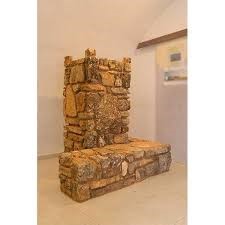
REGARDING ALTARS (Exodus 20:22-26). There shall be no steps leading up to the altar (20:26), illustrating that in the gospel God takes all of the steps to meet us where we are. To climb any steps on our part would only reveal our nakedness.
We cannot add to the perfection and simplicity of God’s design for His altar at the cross. No human instrument can improve it. Salvation is of the Lord and not of human construction.
THE ABOLITION OF SLAVERY AMONG GOD’S PEOPLE; REPLACED WITH COVENANTED LABOR
- Campbell Morgan writes, “Among the first of the Judgments following the enunciation of the Ten Words of the Law, were those which regulated slavery. A careful consideration of them will show that they abolished slavery and substituted for it ‘covenanted labor’. A man might buy a servant, but only for a period of six years’ service. In the seventh year he must go out free. No man was allowed to hold men or women as his property in perpetuity.” (p. 28, Searchlights from the Word).
Slavery had been in existence throughout history. The children of Israel had been slaves in Egypt. God was showing them that mankind was to be free, holy, true, and responsible to God. Through the Law, He was putting mankind back on the path to freedom. As Jesus would say, “You shall know the Truth, and the truth shall make you free” (John 8:32).
THE VOLUNTARY BOND-SLAVE
There was an exception in which a man could voluntarily choose to remain a servant of His Master for a lifetime (Exodus 21:5-6). It could not be done by the compulsion of the Master. It could only be done by the deliberate choice of the servant. It is a choice made by love to serve.
Many see in Exodus 21:1-6 a foreshadowing of the person and work of Christ, who claimed to be the Servant described in Isaiah 42:1; Zechariah 3:8; 52:13; 53:11. Jesus willingly “emptied Himself, taking the form of a bondservant”, (Phil 2:5-7). He fulfilled the requirements of His Master- His Father. In His Transfiguration we see Jesus glorified as the only one who perfectly pleased the Father and fulfilled the righteous requirements of the Law. But Jesus did not come to earth merely to show us what righteousness looks like with skin on. He came to do what the Law could not do. Redeem us. Restore us. Adopt us. Transform us. He came to be born in us. He chooses not to abide alone in His righteousness. Instead, He proceeds to be obedient unto death, the death of the cross.
John 12:24 (NASB) 24 “Truly, truly, I say to you, unless a grain of wheat falls into the earth and dies, it remains alone; but if it dies, it bears much fruit.
Jesus, out of love for His Master, chooses the role of a bondservant and allows Himself to be pierced that He might serve His Master and be with His bride (the church) forever. (See Exodus 21:4-5).
NEW TESTAMENT READING: Matthew 23:13-39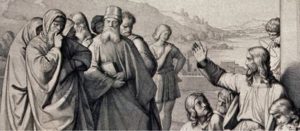
Jesus has some scathing criticism for the scribes and Pharisees here. This shatters the picture of “tender Jesus, meek and mild”. This incident challenges the sentimental image that people have of the Sunday School Jesus, the ‘nicer than God’ Jesus.
The same Jesus who tells us that idle words will be brought up at the judgment lets His indictments fly at the religious leaders, calling them ‘hypocrites’, ‘blind guides’, ‘children of hell’, ‘whitewashed tombs’, ‘beautiful in outward appearance but unclean within’.
Jesus also predicts that these leaders will continue the legacy of their ancestors by torturing and killing God’s messengers, specifically referring to death by crucifixion.
When Jesus speaks of the blood guiltiness of all from Abel to Zechariah coming upon the Pharisees and scribes, he is saying that they who claim to be defending God’s messengers are actually guilty of destroying them! Abel was the first one killed for his faith in the Old Testament scrolls (Genesis 4:8-11). The last scroll in the Hebrew Bible, (2 Chronicles) would conclude with the leaders in Jerusalem killing Zechariah, the son of Jehoiada the priest as the Spirit of God was upon him to proclaim God’s message (2 Chron 24:20-22).
PSALM 28:1-9
This Psalm is attributed to David. He is struggling with what appears to be unanswered prayer in the face of those who pretended to be a friend yet sought his downfall.
David is surrounded by hypocrites. We can see a parallel with the passage we just read in Matthew 23 when Jesus is surrounded by the Pharisees.
In this psalm, we have a cry for mercy (v.1-2), a cry for deliverance (v.3), a cry for justice (v.4-5), and a song of praise (v.6-8) with a climactic petition (v.9)
Psalm 28:9 9 Save Your people and bless Your inheritance; Be their shepherd also, and carry them forever.
Psalm 28:5 5 Because they do not regard the works of the LORD Nor the deeds of His hands, He will tear them down and not build them up.
The Psalmist reminds us that delays are not denials. Prayers like these will be answered in God’s time. Why? “The Lord is a saving defense to His anointed!” (v.8)
PROVERBS: PROVERBS 7:1-5 “MAKE INSIGHT A BELOVED MEMBER OF YOUR FAMILY” (Prov 7:4, NLT)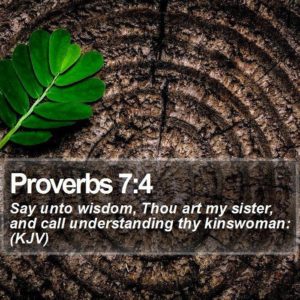
As we read through the Bible, we gain a greater understanding of God’s redemptive work in the world today. The writer of Proverbs reminds us to take God’s commands to heart. Make the insight that God’s Word gives you, your intimate friend.
Proverbs 7:1-4 (NASB) 1 My son, keep my words and treasure my commandments within you. 2 Keep my commandments and live, And my teaching as the apple of your eye. 3 Bind them on your fingers; Write them on the tablet of your heart. 4 Say to wisdom, “You are my sister,” And call understanding your intimate friend.”
PRAYER: Lord, Thank You for the Revelation of Your Righteousness that we receive through Your Word. Thank You for Your Commandments, and that You, the Holy Law-Giver, gave us Jesus to be the Law-Keeper in our hearts as we walk not after the flesh but after the Spirit! Thank You for giving us new life, Your Life! We are embracing Your wisdom as a dear intimate companion! Be glorified in us today! In Jesus’ Name! Amen!
PASTOR DAVID
